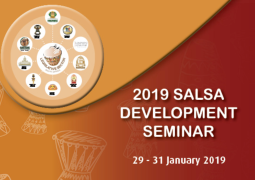
The Secretaries’ Association of the Legislatures of South African (Salsa), an organisation of officials from Parliament and the nine provincial legislatures, recently held a successful seminar to deliberate on a number of developmental issues which seek to improve efficiency in the administration of the legislative sector.
The three-day seminar, held under the theme: “Building the South African Legislative Sector’s Legacy Through Collaboration – Deepening 25 Years of Democracy”, was organised by the Legislative Sector of South Africa, and was attended by the Deputy Speaker of the National Assembly, Mr Lechesa Tsenoli, the Speaker of the Western Cape Provincial Legislature, Ms Shanaz Fernandez, as well as managers from the provincial legislatures and Parliament.
Academics, motivational speakers, as well as experts in various fields presented papers on a number of topics which included; the “Transition of the Legislative Sector Towards Realising a Strengthened South African Democracy, “Parliamentary Leadership and Support, “The Fourth Industrial Revolution” and “The Role of Parliaments on the Delivery of the African Agenda 2063”.
Activities included high-level presentations, question and answer sessions, motivational talks as well as break-away discussion groups on the different subjects affecting Parliament and the provincial legislatures.
On the last day of the seminar, the groups from the break-away sessions reported back to the plenary on their deliberations from day two, before a joint declaration was adopted by the seminar for further interpretation an implementation by the various legislatures
The break-away sessions discussed trends and best practice towards enhancing stakeholder relations and communication; international relations, and the role of South African legislatures.
They also discussed trends and developments in human resources and management thereof, towards strengthened and seamless support for public representatives. And improving labour relations in the sector through collective bargaining for Parliament and the provincial legislatures; and leveraging technology towards the strengthening and capacitation of legislatures in the knowledge economy.
In the declaration, Salsa committed itself to “deepen our understanding of the learnings of the seminar and share our experiences with the rest of the sector to ensure that we enhance our institutions’ appreciation of progress made and opportunities that are still available to the nation. These include building a nation that we aspire for – which is non-racial, non-sexist, united, democratic and prosperous.
The seminar also proposed a review of Salsa’s model of operation, to a possible hybrid model, which will include clear processes and procedures to streamline coordination and ensure accountability within Salsa.
Salsa also resolved to augment the legislative sector’s programme regarding arrangements to prepare for the Fourth Industrial Revolution; and enhance its oversight to ensure the implementation of the National Development Plan, Agenda 2063; the SADC Masterplan, SDGs (Sustainable Development Goals) and other policy priorities by strengthening research and collaboration with relevant institutions, including Chapter 9 institutions – and to align the sector’s institutional plans to realise international, continental, regional and national outcomes.
Presenting the declaration in the seminar for adoption, Mr Peter Skosana, the Secretary to the Gauteng Provincial Legislature, said the seminar also resolved to strengthen engagements with the executive to ensure equitable funding for the legislative sector, in order to strengthen the sector’s autonomy and ability to fulfil its constitutional mandate. And to develop a uniform standard operating procedure that must be adopted by all legislatures, which will ensure the management and processing of the sector’s information.
Mr Skosana said Salsa will also look into the possibility of establishing public participation hubs for knowledge development to ensure that the public is informed of the processes and the constitutional relevance to the public participation process, and consider the prospect of using technology and cyberspace by the legislative sector in preparing for the Fourth Industrial Revolution.
By Sakhile Mokoena
31 January 2019

